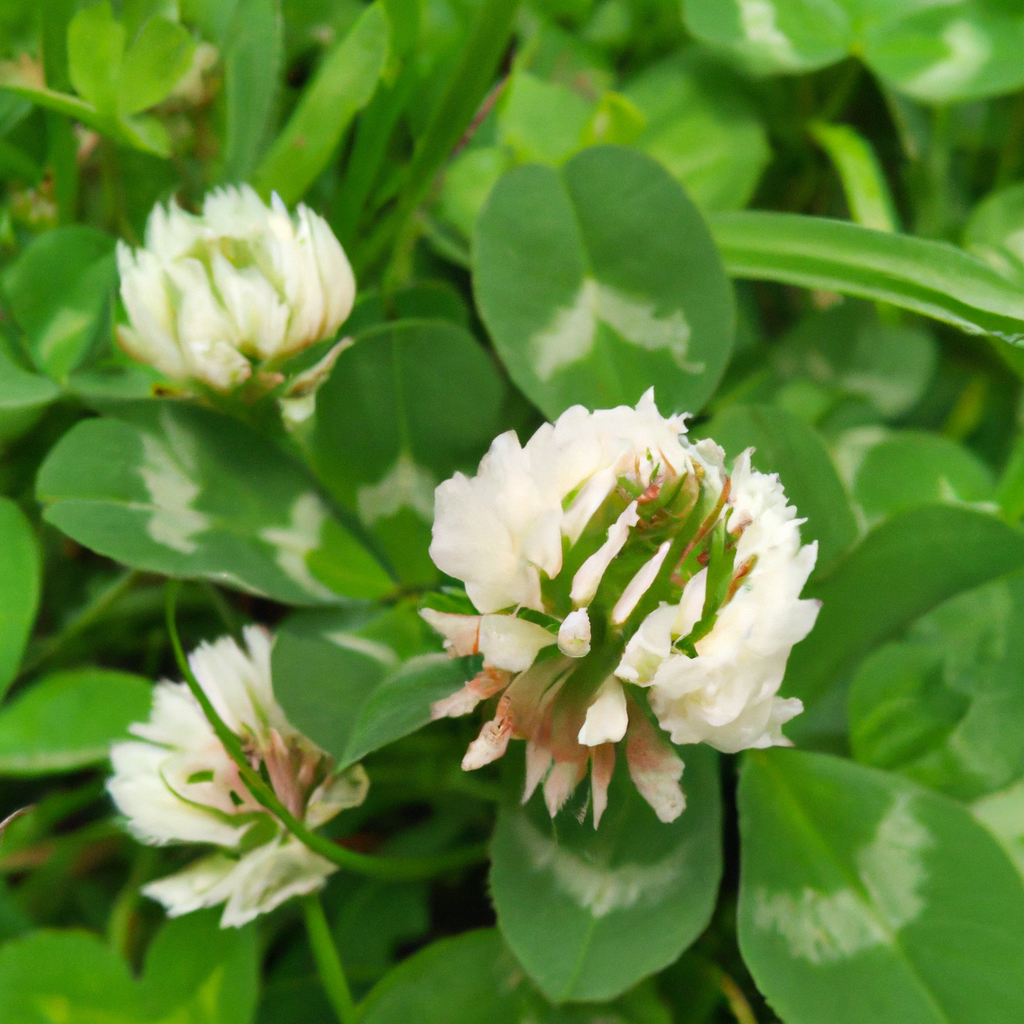Biological Name:
Trifolium repens (White-Clover)
Natural Habitat:
White clover is a type of flowering plant that is native to Europe, Asia, and North America. It is typically found in areas with moist, well-drained soils, such as meadows, pastures, and lawns.
Description:
White-Clover is a perennial herb that is native to Europe and Asia. It has small white flowers and trifoliate leaves. It is often used as a cover crop or forage crop and is also used in herbal medicine.
Frequently Asked Questions (FAQs)
Q: What is white clover used for?
A: It is popular for livestock grazing, soil improvement, erosion control and was once used in lawn seed mixes. White clover (Trifolium repens) with characteristic white leaf markings. White clover is in the legume family (Fabaceae) and is capable of fixing its nitrogen, which enables it to thrive in unfertilized areas.
Source
Q: What does white clover attract?
A: Attracts pollinators: Clover attracts birds, butterflies, honey bees, and other pollinators (many of which are facing habitat loss). They get a natural green home, and you get a beautiful show.
Source
Q: Will clover take over grass?
A: Clover can take over areas of your lawn where grass is thinning or has turned brown. The fix: Regularly aerating your lawn loosens your soil and gives grass roots room to breathe and nutrients to thrive. With grass growing strong, there won’t be bare spots for clover to infiltrate.
Source
Q: Which is better white or red clover?
A: Red clover tends to fix more nitrogen than white Dutch clover does, so it can better fertilize your soil for other grasses. The more nitrogen clover fixes, the healthier your lawn will be — with no synthetic fertilizer needed.
Source
Q: Why do farmers grow white clover?
A: Organic farmers plant clover to improve soil quality and reduce the need for artificial fertilizers. Livestock owners grow it to provide nutrient-dense forage for grazing animals. Gardeners seed it into their lawns to attract beneficial insects.
Source
Q: What are the health benefits of white clovers?
A: White clover is alien and native to Europe. Leaf tea used for colds, coughs, and fevers. Flower tea used for rheumatism and gout. Like many clovers, white clover contains the estrogenic isoflavone genistein which has cancer-preventative and antioxidant activity.
Source
Q: Why is white clover invasive?
A: Quick facts. White and yellow sweetclovers are invasive species. Yellow and white sweetclover grow abundantly on disturbed lands, roadsides and abandoned fields. The plants degrade native grasslands by shading out sun-loving plants, reducing diversity.
Source
Q: Is white clover toxic to dogs?
A: A: All clovers have been noted as being potentially poisonous to pets if they constantly graze. Chemicals used on grass are also harmful.
Source
Q: Is white clover a problem?
A: In fact, white Dutch clover is an indicator plant for low nitrogen meaning that if you see it growing in your lawn, it probably means the soil is low in nitrogen. A well-timed application of organic spring lawn fertilizer can help bump up nitrogen levels (and reduce the amount of clover).
Source
Q: Is white clover good for wildlife?
A: White clover is a good source of protein for deer and turkey, and should be considered when developing food plots for deer along with cost of planting and maintenance, duration of plant life and usefulness to wildlife species in the area.
Source
Q: Is white clover edible for humans?
A: Clover. White Clover (Trifolium repens – pictured above) is a totally edible plant. Eat the leaves raw or cooked as a spinach substitute, or dry them to add to baked goods for a vanilla flavor. The flowers are also edible, as are the seed pods – which when dried can both be ground into a flour.
Source
Q: Is white clover native or invasive?
A: Trifolium repens (White Clover) is listed in the Invasive Plant Atlas of the United States. According to the U.S Forest Service, Invasive species have contributed to the decline of 42% of U.S. endangered and threatened species, and 18% of U.S. endangered or threatened species.
Source
Q: Does white clover spread?
A: White clover has a creeping growth habit and spreads with stolons or “runners”” above the soil with adventitious roots forming at each node. This type of growth pattern is one reason for the excellent grazing tolerance of white clover.”
Source
Q: What is the lifespan of white clover?
A: Lifespan of white clover plant organs. The longevity of leaves or petioles (from when leaflets were 90-95 % unfolded until they were dark brown or missing) ranged from 21 to 86 d regardless of treatment
Source
Q: What month do you plant clover?
A: Plant clover in the spring or early summer, when the ground has become soft and moist from the spring rains. You may also plant in September or early October in most locations. Clover seed is very small, so you may want to mix it with lime or fertilizer to give you more substance to work with.
Source
Q: Is white clover good for a lawn?
A: Clover is resilient, and its strength actually smothers other weeds. If your mower is tired of picking up those pesky, hard-to-kill weeds, clover may be the way to go. Growing clover does not allow room for typical lawn weeds to thrive, meaning the lawns you mow could be weed-free and beautiful!
Source
Q: Will clover choke out grass?
A: The truth is that clover won’t typically crowd out grass, and in fact it can offer certain benefits as part of a well-maintained lawn. Clover adds Nitrogen to the soil, and effectively creates its own fertilizer, meaning that it can help your lawn stay healthier.
Source
Q: Does white clover last all summer?
A: Dutch white clover: Stays green all year round (depending on geographical area). Blooms when mature, providing food for bees. Does best with 4-6 hours of sun daily. Seeds at a rate of about 1lb per 1000 square feet.
Source
Q: How long does white clover last?
A: Lifespan of white clover plant organs. The longevity of leaves or petioles (from when leaflets were 90-95 % unfolded until they were dark brown or missing) ranged from 21 to 86 d regardless of treatment (Fig.
Source
Q: Does white clover stay green in winter?
A: Clover is considered semi-evergreen or evergreen, depending on the region in which it’s planted. It will retain its color through the summer (except in extreme drought) and can stay green year-round in areas where winters aren’t too cold, like in the southern U.S.
Source
Q: Can you walk on white clover?
A: You couldn’t find a lawn seed mix without it! Grasses even return some favors to clovers, especially when it comes to a lush and beautiful lawn. Says Sharapova, White clover can withstand foot traffic, but will do so better mixed with grass.
Source

